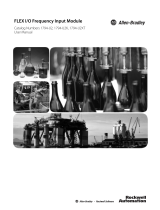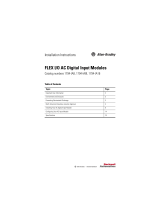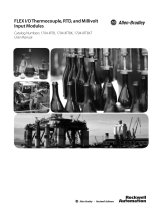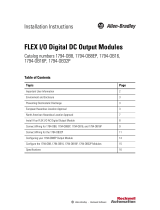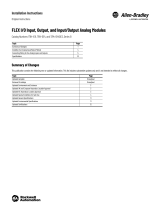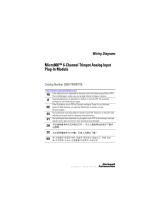Page is loading ...

Installation Instructions
FLEX I/O Digital Input and Output
Modules w/ Diagnostics
Catalog numbers 1794-IB16D, 1794-OB16D
Table of Contents
Topic Page
Important User Information 2
Environment and Enclosure 3
Preventing Electrostatic Discharge 3
North American Hazardous Location Approval 4
Installing Your Digital Input or Output Module 6
Diagnostics 12
Configuring Your Module 15
Specifications 17

2 FLEX I/O Digital Input and Output Modules w/ Diagnostics
Publication 1794-IN096C-EN-P - August 2015
Important User Information
Solid-state equipment has operational characteristics differing from those of electromechanical
equipment. Safety Guidelines for the Application, Installation, and Maintenance of Solid-State Controls
(Publication SGI-1.1
available from your local Rockwell Automation Sales Office or online at
http://www.rockwellautomation.com/literature/
) describes some important differences between
solid-state equipment and hard-wired electromechanical devices. Because of this difference, and also
because of the wide variety of uses for solid-state equipment, all persons responsible for applying this
equipment must satisfy themselves that each intended application of this equipment is acceptable.
In no event will Rockwell Automation, Inc. be responsible or liable for indirect or consequential damages
resulting from the use or application of this equipment.
The examples and diagrams in this manual are included solely for illustrative purposes. Because of the
many variables and requirements associated with any particular installation, Rockwell Automation, Inc.
cannot assume responsibility or liability for actual use based on the examples and diagrams.
No patent liability is assumed by Rockwell Automation, Inc. with respect to use of information, circuits,
equipment, or software described in this manual.
Reproduction of the contents of this manual, in whole or in part, without written permission of Rockwell
Automation, Inc., is prohibited.
Throughout this manual, when necessary, we use notes to make you aware of safety considerations.
WARNING: Identifies information about practices or circumstances that can cause an
explosion in a hazardous environment, which may lead to personal injury or death,
property damage, or economic loss.
ATTENTION: Identifies information about practices or circumstances that can lead to
personal injury or death, property damage, or economic loss. Attentions help you
identify a hazard, avoid a hazard, and recognize the consequences.
SHOCK HAZARD: Labels may be on or inside the equipment (for example, drive or
motor) to alert people that dangerous voltage may be present.
BURN HAZARD: Labels may be on or inside the equipment (for example, drive or
motor) to alert people that surfaces may reach dangerous temperatures.
IMPORTANT Identifies information that is critical for successful application and understanding of
the product.

FLEX I/O Digital Input and Output Modules w/ Diagnostics 3
Publication 1794-IN096C-EN-P - August 2015
Environment and Enclosure
Preventing Electrostatic Discharge
ATTENTION: This equipment is intended for use in a Pollution Degree 2
industrial environment, in overvoltage Category II applications (as defined in IEC
publication 60664-1), at altitudes up to 2000 m (6562 ft) without derating.
This equipment is considered Group 1, Class A industrial equipment according
to IEC/CISPR Publication 11. Without appropriate precautions, there may be
potential difficulties ensuring electromagnetic compatibility in other
environments due to conducted as well as radiated disturbance.
This equipment is supplied as open-type equipment. It must be mounted within
an enclosure that is suitably designed for those specific environmental
conditions that will be present and appropriately designed to prevent personal
injury resulting from accessibility to live parts. The interior of the enclosure
must be accessible only by the use of a tool. Subsequent sections of this
publication may contain additional information regarding specific enclosure type
ratings that are required to comply with certain product safety certifications.
In addition to this publication, see:
• Industrial Automation Wiring and Grounding Guidelines, Rockwell
Automation publication 1770-4.1
, for additional installation requirements.
• NEMA Standard 250 and IEC 60529, as applicable, for explanations of the
degrees of protection provided by different types of enclosure.
ATTENTION: This equipment is sensitive to electrostatic discharge, which can
cause internal damage and affect normal operation. Follow these guidelines
when you handle this equipment:
• Touch a grounded object to discharge potential static.
• Wear an approved grounding wriststrap.
• Do not touch connectors or pins on component boards.
• Do not touch circuit components inside the equipment.
• Use a static-safe workstation, if available.

4 FLEX I/O Digital Input and Output Modules w/ Diagnostics
Publication 1794-IN096C-EN-P - August 2015
North American Hazardous Location Approval
The following modules are North American Hazardous Location approved: 1794-IB16D,
1794-OB16D.
The following information applies when
operating this equipment in hazardous
locations:
Informations sur l’utilisation de cet
équipement en environnements dangereux:
Products marked "CL I, DIV 2, GP A, B, C, D" are suitable for
use in Class I Division 2 Groups A, B, C, D, Hazardous
Locations and nonhazardous locations only. Each product is
supplied with markings on the rating nameplate indicating
the hazardous location temperature code. When combining
products within a system, the most adverse temperature code
(lowest "T" number) may be used to help determine the
overall temperature code of the system. Combinations of
equipment in your system are subject to investigation by the
local Authority Having Jurisdiction at the time of installation.
Les produits marqués "CL I, DIV 2, GP A, B, C, D" ne
conviennent qu'à une utilisation en environnements de
Classe I Division 2 Groupes A, B, C, D dangereux et non
dangereux. Chaque produit est livré avec des marquages
sur sa plaque d'identification qui indiquent le code de
température pour les environnements dangereux. Lorsque
plusieurs produits sont combinés dans un système, le code
de température le plus défavorable (code de température le
plus faible) peut être utilisé pour déterminer le code de
température global du système. Les combinaisons
d'équipements dans le système sont sujettes à inspection
par les autorités locales qualifiées au moment de
l'installation.
EXPLOSION HAZARD
• Do not disconnect equipment unless power
has been removed or the area is known to be
nonhazardous.
• Do not disconnect connections to this
equipment unless power has been removed
or the area is known to be nonhazardous.
Secure any external connections that mate
to this equipment by using screws, sliding
latches, threaded connectors, or other
means provided with this product.
• Substitution of components may impair
suitability for Class I, Division 2.
• If this product contains batteries, they must
only be changed in an area known to be
nonhazardous.
RISQUE D’EXPLOSION
• Couper le courant ou s'assurer que
l'environnement est classé non dangereux
avant de débrancher l'équipement.
• Couper le courant ou s'assurer que
l'environnement est classé non dangereux
avant de débrancher les connecteurs.
Fixer tous les connecteurs externes reliés
à cet équipement à l'aide de vis, loquets
coulissants, connecteurs filetés ou autres
moyens fournis avec ce produit.
• La substitution de composants peut
rendre cet équipement inadapté à une
utilisation en environnement de Classe I,
Division 2.
• S'assurer que l'environnement est classé
non dangereux avant de changer les piles.

FLEX I/O Digital Input and Output Modules w/ Diagnostics 5
Publication 1794-IN096C-EN-P - August 2015
ATTENTION: FLEX™ I/O is grounded through the DIN rail to chassis ground.
Use zinc plated yellow-chromate steel DIN rail to assure proper grounding. The
use of other DIN rail materials (for example, aluminum or plastic) that can
corrode, oxidize, or are poor conductors, can result in improper or intermittent
grounding. Secure DIN rail to mounting surface approximately every 200 mm
(7.8 in.) and use end-anchors appropriately.
WARNING: If you insert or remove the module while backplane power is on,
an electrical arc can occur. This could cause an explosion in hazardous
location installations. Be sure that power is removed or the area is
nonhazardous before proceeding.

6 FLEX I/O Digital Input and Output Modules w/ Diagnostics
Publication 1794-IN096C-EN-P - August 2015
Installing Your Digital Input or Output Module
The input module mounts on a 1794-TB32 or 1794-TB32S terminal base. The output
module mounts on a 1794-TB2, 1794-TB3, or 1794-TB3S terminal base.
1. Rotate the keyswitch (1) on the terminal base (2) clockwise to position 2 as
required for this type of module.
2. Make certain the flexbus connector (3) is pushed all the way to the left to connect
with the neighboring terminal base/adapter. You cannot install the module
unless the connector is fully extended.
3. Make sure the pins on the bottom of the module are straight so they will align
properly with the connector in the terminal base.
Description Description
1 Keyswitch 5 Alignment bar
2 Terminal base 6 Groove
3 Flexbus connector 7 Latching mechanism
4 Module
ATTENTION: During mounting of all devices, be sure that all debris (metal
chips, wire strands, etc.) is kept from falling into the module. Debris that falls
into the module could cause damage on power up.
1
2
3
4
5
6
7

FLEX I/O Digital Input and Output Modules w/ Diagnostics 7
Publication 1794-IN096C-EN-P - August 2015
4. Position the module (4) with its alignment bar (5) aligned with the groove (6) on
the terminal base.
5. Press firmly and evenly to seat the module in the terminal base unit. The module
is seated when the latching mechanism (7) is locked into the module.
Connecting Wiring for the 1794-IB16D Module
(using a 1794-TB32 or 1794-TB32S Terminal Base)
1. Connect individual input wiring (IN00-IN15) to terminals 0 thru 15 on the 0-15
row (A) as indicated in the Wiring Connections for 1794-IB16D table.
2. Connect individual Sensor Power wiring (sensor power 0...15) to terminals
17...32 on the 16-33 row (B) as indicated in the Wiring Connections for
1794-IB16D table. Do not connect to terminals 16 or 33.
3. Connect the associated +V2 DC power lead of the input device to the
corresponding terminal on the 34-51 row (C) for each input as indicated in the
Wiring Connections for 1794-IB16D table. (The +V2 power terminals of row
(C) are internally connected together.)
4. Connect the associated input common (3-wire devices only) to the
corresponding terminal on the 34-51 row. (C) for each input as indicated in the
Wiring Connections for 1794-IB16D table. (Commons are internally connected
together.)
5. Connect +V DC power to pin 43 (+V) on the 34-51 row (C).
6. Connect -V DC common to pin 44 (COM2) on the 34-51 row (C).
7. If daisychaining input wiring power to the next terminal base, connect a jumper
from terminal 49 (+V DC) on this base unit to the power terminal on the next
base unit (refer to the installation instructions for the next terminal base unit).
8. If continuing input wiring common to the next base unit, connect a jumper from
terminal 50 (common) on this base unit to the common terminal on the next base
unit (refer to the installation instructions for the next terminal base unit).

8 FLEX I/O Digital Input and Output Modules w/ Diagnostics
Publication 1794-IN096C-EN-P - August 2015
1794-TB32 and 1794-TB32S Terminal Base Wiring for 1794-IB16D
17 18 19 20 21 22 23 24 25 26 27 28 29 30 31 32 33
0 1 2 3 4 5 6 7 8 9 10 11 12 13 14 15
16
35 36 37 38 39 40 41 42 43 44 45 46 47 48 49 50 51
34
NC
+V2 = Terminals 43, 45, 47 and 49 -
Input Terminals 0-15
Sensor Power Terminals 0-15
+V1 COM1 +V1 COM1 +V1 COM1 +V1 COM1 +V2 COM2 +V2 COM2 +V2 COM2 +V2 COM2 NC
+V1 = Terminals 35, 37, 39 and 41 (not used)
COM1, COM2 = Terminals 36, 38, 40, 42, 44, 46, 48 and 50 -
NC = No connections (terminals 16, 33, 34 and 51)
NC NC
(1794-TB32 shown)
Voltage applied to Inputs 0-15 and Sensor power 0-15
Common for inputs 0 thru 15 and sensor power 0 thru 15
A
B
C

FLEX I/O Digital Input and Output Modules w/ Diagnostics 9
Publication 1794-IN096C-EN-P - August 2015
Wiring Connections for 1794-IB16D
(use with 1794-TB32 or 1794-TB32S terminal base units)
Input Input
Terminal
Sensor Power
Terminal
Common Supply
(1)
(1)
3-wire devices only. 2-wire devices use input and sensor power terminals; 3-wire devices use input, sensor power and common
terminals.
IN 00 A-0 B-17 -V common
connected to
terminals 36, 38,
40, 42, 44, 46, 48,
and 50
+V2 connected to
terminals 43, 45,
47, and 49IN 01 A-1 B-18
IN 02 A-2 B-19
IN 03 A-3 B-20
IN 04 A-4 B-21
IN 05 A-5 B-22
IN 06 A-6 B-23
IN 07 A-7 B-24
IN 08 A-8 B-25
IN 09 A-9 B-26
IN 10 A-10 B-27
IN 11 A-11 B-28
IN 12 A-12 B-29
IN 13 A-13 B-30
IN 14 A-14 B-31
IN 15 A-15 B-32
+V2 DC power Power terminals 43, 45, 47 and 49 (power terminals are internally connected
together in the module)
COM DC return Common terminals 36, 38, 40, 42, 44, 46, 48 and 50 (common terminals are
internally connected together in the module)

10 FLEX I/O Digital Input and Output Modules w/ Diagnostics
Publication 1794-IN096C-EN-P - August 2015
Connecting Wiring for the 1794-OB16D Module
(using a 1794-TB2, 1794-TB3, or 1794-TB3S Terminal Base)
1. Connect individual output wiring to numbered terminals on the 0-15 row (A) as
indicated in the Wiring Connections for 1794-OB16D table.
2. Connect the associated common for each output to the corresponding terminal
on the 16-33 row (B) as indicated in the Wiring Connections for 1794-OB16D
table. (The common terminals of row (B) are internally connected together.)
3. Connect +V DC power to terminal 34 on the 34-51 row (C). (The power
terminals of row (C) are internally connected together.)
4. Connect DC common (COM) to terminal 16 on the 16-33 row (B).
5. If daisychaining power to the next terminal base, connect a jumper from terminal
51 (+V DC) on this base unit to terminal 34 on the next base unit.
6. If continuing DC common to the next base unit, connect a jumper from terminal
33 (common) on this base unit to terminal 16 on the next base unit.
1794-TB2, 1794-TB3, and 1794-TB3S Terminal Base Wiring for 1794-OB16D
17 18 19 20 21 22 23 24 25 26 27 28 29 30 31 32 33
0 1 2 3 4 5 6 7 8 9 10 11 12 13 14 15
16
35 36 37 38 39 40 41 42 43 44 45 46 47 48 49 50 51
34
Outputs
Commons
(1794-TB3 shown)
-V (Supply Common) = Terminals B-16 thru B-33
+V (Supply +Voltage In) = Terminals C-34 thru C-51
-V
Voltage
In +V
Voltage
Out +V
Voltage
A
B
C
(Use B-33 and C-51 for daisy-chaining to next terminal base unit)
Common
-V
Common
Terminals 35 thru 50 not available on 1794-TB2

FLEX I/O Digital Input and Output Modules w/ Diagnostics 11
Publication 1794-IN096C-EN-P - August 2015
Wiring Connections for 1794-OB16D
(use with 1794-TB2, 1794-TB3, or 1794-TB3S terminal base units)
Output Output Terminal Common Terminal
Output 00 A-0 B-17
Output 01 A-1 B-18
Output 02 A-2 B-19
Output 03 A-3 B-20
Output 04 A-4 B-21
Output 05 A-5 B-22
Output 06 A-6 B-23
Output 07 A-7 B-24
Output 08 A-8 B-25
Output 09 A-9 B-26
Output 10 A-10 B-27
Output 11 A-11 B-28
Output 12 A-12 B-29
Output 13 A-13 B-30
Output 14 A-14 B-31
Output 15 A-15 B-32
+V DC C-34 and C-51 (1794-TB2) (Power Terminals are internally connected in the
terminal base unit.
C-34...C-51 (1794-TB3, -TB3S) (Power terminals are internally connected in the
terminal base unit.
Common B-16...B-33 (Common terminals are internally connected in the terminal base unit.

12 FLEX I/O Digital Input and Output Modules w/ Diagnostics
Publication 1794-IN096C-EN-P - August 2015
Diagnostics
(See configuration information below for location of diagnostic bits.) Note: Each unused
sensor port requires a dummy resistor to mask the channel diagnostic function.
Diagnostic Functions for the 1794-IB16D
Ext.
Power
Wiring Input
Status
Channe
l LED
Status
Open
Wire
Error
Bit
Short
Error
Bit
Rev.
Error
Bit
Module
Error
Bit/LED
OFF Open Off Off 0 0 0 0/OFF
On Off 0 0 0 0/OFF
Short Off Off 0 0 0 0/OFF
On Off 0 0 0 0/OFF
Normal Off Off 0 0 0 0/OFF
On Off 0 0 0 0/OFF
ON Open Off
RED 1001/RED
On
RED/YEL 1001/RED
Short Off
RED 0 101/RED
On
RED/YEL 0 101/RED
Normal Off Off 0 0 0 0/OFF
On
YEL 0 0 0 0/OFF
REV Open Off Off 0 0
1 1/RED
On Off 0 0
1 1/RED
Short Off Off 0 0
1 1/RED
On Off 0 0
1 1/RED
Normal Off Off 0 0
1 1/RED
On Off 0 0
1 1/RED
The module monitors each sensor-power port for current and voltage. It turns on the channel red LED
and sets (1) the error bit when 1) the module detects a short circuit (no voltage at the sensor-port), and 2)
the module detects an open wire ( no current at the sensor-port).

FLEX I/O Digital Input and Output Modules w/ Diagnostics 13
Publication 1794-IN096C-EN-P - August 2015
Diagnostic Functions for the 1794-OB16D
Ext.
Power
Wiring Input
Status
Channe
l LED
Status
Open
Wire
Error
Bit
Short
Error
Bit
Rev.
Error
Bit
Module
Error
Bit/LED
OFF Open Off Off 0 0 0 0/OFF
On Off 0 0 0 0/OFF
Short Off Off 0 0 0 0/OFF
On Off 0 0 0 0/OFF
Normal Off Off 0 0 0 0/OFF
On Off 0 0 0 0/OFF
ON Open Off
RED 1001/RED
On
YEL 0 0 0 0/OFF
Short Off Off 0 0 0 0/OFF
On
RED 0 101/RED
Normal Off Off 0 0 0 0/OFF
On
YEL 0 0 0 0/OFF
REV Open Off Off 0 0
1 1/RED
On Off 0 0
1 1/RED
Short Off Off 0 0
1 1/RED
On Off 0 0
1 1/RED
Normal Off Off 0 0
1 1/RED
On Off 0 0
1 1/RED
The module monitors each output channel. It turns on the channel red LED and sets (1) the error bit when
1) the module detects a short circuit (the output signal is active at a channel and the corresponding
output voltage is low), and 2) the module detects an open wire (the output signal is inactive at a channel
and the corresponding output voltage is high).

14 FLEX I/O Digital Input and Output Modules w/ Diagnostics
Publication 1794-IN096C-EN-P - August 2015
Sensor Diagram for the 1794-IB16D Module
Sensor Diagram for the 1794-OB16D Module
3-Wire
Sensor
External
Power
Supply
1794-IB16D
3-Wire
Sensor
2-Wire
Sensor
External
Power
Supply
1794-IB16D
2-Wire
Sensor
3-Wire
Sensor
External
Power
Supply
1794-IB16D
Dummy
Resistor
External
Power
Supply
1794-IB16D
Shunt
Resistor
Shunt
Resistor
Sensor-power lines -
Detect open wire
Detect short circuit
Sensor-power lines -
Detect open wire
3-Wire
Sensor
External
Power
Supply
1794-IB16D
3-Wire
Sensor
2-Wire
Sensor
External
Power
Supply
1794-IB16D
2-Wire
Sensor
3-Wire
Sensor
External
Power
Supply
1794-IB16D
Dummy
Resistor
External
Power
Supply
1794-IB16D
Shunt
Resistor
Shunt
Resistor
Sensor-power lines -
Detect open wire
Detect short circuit
Sensor-power lines -
Detect open wire
Unused input port -
Dummy resistor needed or
Fault LED remains lighted.
20kΩ, ≥1/8W
20kΩ, ≥1/8W
+
_
+
_
+
_
+
_
20kΩ, ≥1/8W
Load
External
Power
Supply
1794-OB16D
Dummy
Resistor
Unused output port -
Dummy resistor needed or
Fault LED remains lighted.
10kΩ, ≥1/8W
+
_

FLEX I/O Digital Input and Output Modules w/ Diagnostics 15
Publication 1794-IN096C-EN-P - August 2015
Configuring Your Module
Configuring Your 1794-IB16D Input Module
Configure your input module by setting bits in the configuration word (word 3). This
module is compatible with the Remote I/O network (with 1794-ASB series E or later),
DeviceNet network, and the ControlNet network. (Note: You must use the Module
Connection when used in a ControlNet system.)
Setting the Input Filter Time
To set the input filter time, set the associated bits in the output image (complementary
word) for the module.
Image Table Memory Map for the 1794-IB16D Module
Dec 1514131211109876543210
Oct 17161514131211107 6 5 4 3 2 1 0
Read 1 I15I14I13I12I11I10I9I8I7I6I5I4I3I2I1I0
Read 2 Read Diagnostic Status
Write 3 Not Used Input Filter FT
0...15
Not Used
Where
Diagnostic
Status
I = Input status
FT = Filter Time
Bit 00 = Module error;
Bit 01 = External power reverse polarity error;
Bit 02 = Sensor power short error;
Bit 03 = Sensor power open wire error
15 14 13 12 11 10 9 8 7 6 5 4 3 2 1 0
1794-IB16D
FT = 0-15
FLL
I:000
00
Fill File
Source
Destination
Length
#O:010
1
Write FT to complement
of input module.
Write filter time on system startup.
O:010
Dec.
12 11 10 9 8 7 6 5
1
= 5 Octal or 5 Decimal
01
1794-IB16D

16 FLEX I/O Digital Input and Output Modules w/ Diagnostics
Publication 1794-IN096C-EN-P - August 2015
Configuring Your 1794-OB16D Output Module
Configure your output module by setting bits in the configuration word (word 3). This
module is compatibility with the Remote I/O network (with 1794-ASB series D or later),
DeviceNet network, and the ControlNet network. (Note: You can use the Module
Connection or Rack Connection when used in a ControlNet system.)
Input Filter Time
Bits Description Filter Time
10 09 08 Filter Time for inputs 0...15 Off to On /
On to Off
000Filter Time 0 (Default) 0.25 ms
001Filter Time 1 0.5 ms
010Filter Time 2 1 ms
011Filter Time 3 2 ms
101Filter Time 4 4 ms
101Filter Time 5 8 ms
110Filter Time 6 16 ms
111Filter Time 7 32 ms
Image Table Memory Map for the 1794-OB16D Module
Dec 1514131211109876543210
Oct 17161514131211107 6 5 4 3 2 1 0
Read 1 Not used Read Diagnostic Status
Write 2 O15O14O13O12O11O10O9O8O7O6O5O4O3O2O1O0
Where
Diagnostic
Status
O = Output
Bit 00 = Module error;
Bit 01 = External power reverse polarity error;
Bit 02 = Output short error;
Bit 03 = Output open wire error

FLEX I/O Digital Input and Output Modules w/ Diagnostics 17
Publication 1794-IN096C-EN-P - August 2015
Specifications
Specifications – 16 Input Module w/ Diagnostics, 1794-IB16D
Meets IEC 3 24V DC input specifications
Attribute Value
Number of inputs 16, current, sinking
Recommended terminal base unit 1794-TB32, 1794-TB32S, 1794-TB62DS, 1794-TB62EXD4X15
On-state voltage, min 10V DC
On-state voltage, nom 24V DC
On-state voltage, max 31.2V DC
On-state current, min 2.0 mA
On-state current, max 1.5 mA
Off-state voltage, max 5.0V DC
Off-state current, max 1.5 mA
Nominal input impedance 3.1 kΩ
Isolation voltage 50V (continuous), Basic Insulation Type
Type tested @ 2121V DC for 2 s, between field side and system
No isolation between individual channels
Input filter time
(1)
Off to On
On to Off
(1)
Input off-to-on filter time is the time from a valid input signal to recognition by the module. Input on-to-off filter time is
time from the input signal dropping below the valid level to recognition by the module.
Refer to Input Filter Time table
FlexBus current 30 mA @ 5V DC
Power dissipation, max 8.5 W @ 31.2V DC
Thermal dissipation, max 29 BTU/hr @ 31.2V DC
Sensor power, voltage drop, max 2.2V DC
Sensor power, current, max 50 mA
Sensor power line, short detect circuit,
min
1.0 A (in 10 s)
Sensor power line, open wire detect,
max
50 μA
Detect reverse polarity voltage Minimum 10V: Module must detect if the reverse polarity
external power supply voltage is greater than the value.

18 FLEX I/O Digital Input and Output Modules w/ Diagnostics
Publication 1794-IN096C-EN-P - August 2015
Specifications – 16 Output Module w/ Diagnostics, 1794-OB16D
Attribute Value
Number of outputs 16, nonisolated
Recommended terminal base unit 1794-TB2, 1794-TB3, 1794-TB3S
Output voltage, min 10V DC
Output voltage, nom 24V DC
Output voltage, max 31.2V DC
Output current rating 8.0 A (16 outputs @ 0.5 A)
On-state current, min 1.0 mA per channel
On-state current, max 500 mA per channel
Surge current 2 A for 50 ms each, repeatable every 2 seconds
Off-state leakage, max 0.5 mA
Isolation voltage 50V (continuous), Basic Insulation Type
Type tested at 850V DC for 60 s, between field side and system
No isolation between individual channels
Output signal delay
(1)
Off to On
On to Off
0.5 ms
0.5 ms
FlexBus current 60 mA @ 5V DC
Power dissipation, max 4.8 W @ 31.2V DC
Thermal dissipation, max 16.4 BTU/hr @ 31.2V DC
Short circuit protect and detection Thermal shutdown (auto reset) Detection condition: when
external power active, output signal active, and output port
voltage less than 2V.
Open wire detect off-state leakage
current
0.1 mA – When external power active and output signal inactive.
Detect reverse polarity voltage Minimum 10V: Module must detect if the reverse polarity
external power supply voltage is greater than the value.
(1)
Delay time is the time from the receipt of an output on or off command to the output actually turning on or off.

FLEX I/O Digital Input and Output Modules w/ Diagnostics 19
Publication 1794-IN096C-EN-P - August 2015
General Specifications
Attribute Value
Terminal base screw torque Determined by installed terminal base
Dimensions, approx. (H x W x D) 45.7 x 94 x 53.3 mm (1.8 x 3.7 x 2.1 in.) – 1794-IB16D
94 x 94 x 91 mm (3.7 x 3.7 x 3.6 in.) – 1794-OB16D
Indicators (field side) 16 yellow ON/OFF status indicators
16 red diagnostic status indicators
1 red module fault indicator
External DC power supply voltage, nom 24V DC
External DC power voltage range 10...31.2V DC (includes 5% AC ripple)
North American temp code T3C
Keyswitch position 2
Enclosure type rating None (open-style)
Wire size Determined by installed terminal base
Wiring category
(1)
2 - on signal ports
(1)
Use this conductor category information for planning conductor routing as described in Industrial Automation Wiring
and Grounding Guidelines, publication 1770-4.1.
Environmental Specifications
Attribute Value
Operating temperature IEC 60068-2-1 (Test Ad, Operating Cold),
IEC 60068-2-2 (Test Bd, Operating Dry Heat),
IEC 60068-2-14 (Test Nb, Operating Thermal Shock):
0…55 °C (32…131 °F)
Storage temperature IEC 60068-2-1 (Test Ab, Unpackaged Non-operating Cold),
IEC 60068-2-2 (Test Bb, Unpackaged Non-operating Dry Heat),
IEC 60068-2-14 (Test Na, Unpackaged Non-operating Thermal Shock):
-40…85 °C (-40…185 °F)
Relative humidity IEC 60068-2-30 (Test Db, Unpackaged Damp Heat):
5…95% non-condensing
Vibration IEC60068-2-6 (Test Fc, Operating):
5 g @ 10...500 Hz
Shock, operating IEC60068-2-27 (Test Ea, Unpackaged shock):
30 g
Shock, nonoperating IEC60068-2-27 (Test Ea, Unpackaged shock):
50 g

20 FLEX I/O Digital Input and Output Modules w/ Diagnostics
Publication 1794-IN096C-EN-P - August 2015
Emissions CISPR 11:
Group 1, Class A (with appropriate enclosure)
ESD immunity IEC 61000-4-2:
6 kV contact discharges
8 kV air discharges
Radiated RF immunity IEC 61000-4-3:
10V/m with 1 kHz sine-wave 80% AM from 80...2000 MHz
10V/m with 200 Hz 50% Pulse 100% AM @ 900 MHz
10V/m with 200 Hz 50% Pulse 100% AM @ 1890 MHz
1V/m with 1 kHz sine-wave 80% AM from 2000...2700 MHz
EFT/B immunity IEC 61000-4-4:
±2 kV @ 5 kHz on power ports
±2 kV @ 5 kHz on signal ports
Surge transient immunity IEC 61000-4-5:
±1 kV line-line(DM) and ±2 kV line-earth(CM) on signal ports
Conducted RF immunity IEC 61000-4-6:
10V rms with 1 kHz sine-wave 80% AM from 150 kHz…80 MHz
Certifications
Certifications (when
product is marked)
(1)
Value
c-UL-us UL Listed Industrial Control Equipment, certified for US and Canada.
See UL File E65584.
UL Listed for Class I, Division 2 Group A,B,C,D Hazardous Locations,
certified for U.S. and Canada. See UL File E194810.
CE European Union 2004/108/EC EMC Directive, compliant with:
EN 61326-1; Meas./Control/Lab., Industrial Requirements
EN 61000-6-2; Industrial Immunity
EN 61000-6-4; Industrial Emissions
EN 61131-2; Programmable Controllers (Clause 8, Zone A & B)
European Union 2006/95/EC LVD, compliant with:
EN 61131-2; Programmable Controllers (Clause 11)
KC Korean Registration of Broadcasting and Communications Equipment,
compliant with: Article 58-2 of Radio Waves Act, Clause 3
EAC Russian Customs Union TR CU 020/2011 EMC Technical Regulation
RCM Australian Radiocommunications Act, compliant with:
AS/NZS CISPR 11; Industrial Emissions
Environmental Specifications
Attribute Value
/

